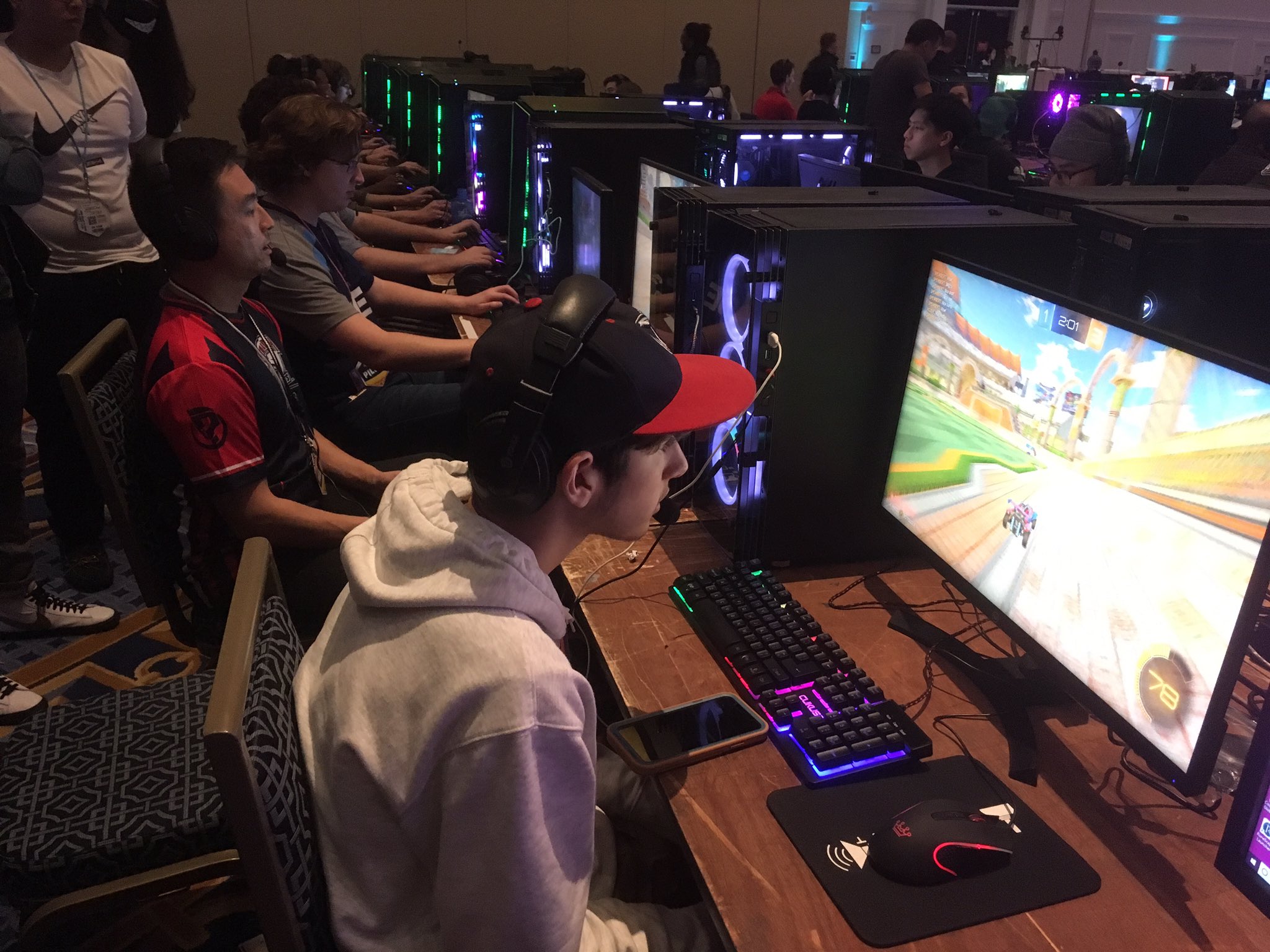His journey in esports began in the driver’s seat of a Honda Civic he called Cecil, with an Xbox and a TV he lugged to gaming house parties. Joey Gawrysiak and his firends would play console games for hours every weekend, competing for supremacy in titles such as Halo.
The fun continued through college at the University of Georgia, where he not only gamed through the hallways in Augusta but also helped develop a team that traveled to small, regional events. He never dreamed video games could be any more than that.
But while he was studying for his Ph.D., a professor convinced him he should pursue that passion through education. He ultimately turned his traditional sport management path into one that focused on esports.
Gawrysiak landed a job at Shenandoah University in 2012 and went to work building what would become one of the most influential esports programs in the country. He taught an Introduction to Esports class and pulled together a club team with the help of students. He then helped it gain varsity status. Later, he turned that one class into a full-blown major, which launched last fall. He also has a new esports arena that will be officially unveiled when students return to school. (True to Gawrysiak’s roots in gaming, part of it can be taken on the road and set up to do mobile events.)
Sign Up For Esports Newsletter: Get exclusive content and the latest news in our Academic Esports newsletter, which is free to sign up for here.
Full Academic Esports Conference Agenda: Check out all of the speakers and sessions slated for the inaugural event here.
In October, Gawrysiak and Christopher Scroggins, Shenandoah’s Instructor of Esports, will share their story, their journey and lessons learned in developing a gaming program around education at the Academic Esports Conference & Expo (October 19-21). Among the takeaways they’ll deliver: how valuable esports programs can be to universities and colleges.
“Recruitments and retention are huge buzzwords in education, so how do you retain students and how do you attract this generation? You have to offer them more than just academics and traditional courses,” Gawrysiak says. “Esports makes for a really cool space, a cool community of students, faculty, staff, community members.
“You’ve got to take chances, especially in our current environment. Some things will fail, and that’s OK. If you’re doing something that’s not making money, then you’re not going to have that as a program very long. You’ve got to be willing to think outside the box and ask, what is the next big thing that we want to prepare our students for?”
The path to a major
 That next big thing for students could be a role in or around the multi-billion-dollar video game industry, where opportunities are becoming more prevalent. They are leveraging both in-class instruction and experiences to launch careers, especially at university programs such as Shenandoah, Harrisburg University, Boise State University and Becker College.
That next big thing for students could be a role in or around the multi-billion-dollar video game industry, where opportunities are becoming more prevalent. They are leveraging both in-class instruction and experiences to launch careers, especially at university programs such as Shenandoah, Harrisburg University, Boise State University and Becker College.
Shenandoah didn’t just put muscle behind its esports teams, it went much further by systematically building out curriculum, and eventually a major, to enhance those pathways.
At the conference, Gawrysiak and Scroggins plan to present specific concepts on adapting a curriculum to fit into different schools, as well as developing an academic advisory board, building industry partnerships, and leveraging student recruitment and involvement to foster experiential learning opportunities. They also will dive deep on classes that should and could be offered and potential on-campus spaces that might be available to further the esports experience.
“The goal of our esports program is to prepare students for life after college to be successful,” Gawrysiak says. “They might work in esports or they might work in sports or technology, or a medical field. Either way, I want students to have a high-quality college experience, academically, socially, and emotionally.”
Shenandoah offers several courses within its 45-credit major, including the repurposed Introduction to Esports, as well learning classes in which students must meet internship requirements. The program offers an all-encompassing esports foundation, from classes on business and contemporary issues to 300-level courses on performance side of esports, such as exercise, science, nutrition and training.
Gawrysiak says the key to any successful esports curriculum is having knowledgeable instructors and not just those who study books and trends, but those who are immersed in game play, too.
“The kids already know esports, so if you don’t have that knowledge, how are you going to look in front of them?” Gawrysiak says. “The problem a lot of universities have when they come out with these programs is, who can teach it? They have these great ideas but have nobody that can actually teach this stuff. You have to really know esports, which is not easy to do if you don’t actually play any yourself.”
Esports ‘gives me a reason to be at Shenandoah’
Though the major just launched last fall and with little fanfare, Shenandoah’s program already boasts a total of 22 students, including several who either switched or added the major. For those who enter the program, it is not what many outsiders, including parents, expect. It was purposely designed by Gawrysiak to be intense and rigorous.
“I tell them, I need you to work your butt off,” he says. “I’m going to make you fail on purpose, because this is the time to do it. It’s the time to fail and try new things because the real world is not that time.
“I’m getting students in here that want to put in the extra work; that are putting in the time and effort; that are spending extra hours outside the classroom; and doing things around esports at the university. I don’t really have to recruit for the next generation, because our students are kind of telling our story, because they’re excited to do it. And they know that it can help them get a job in the future.”
A future in esports is where many of those students want to be, whether they are in the major or not.
“They have that passion for esports because it’s what they’ve always done in their spare time for fun,” Gawrysiak says. “They can potentially make a career out of it and study it in college. A number of our students that are not esports majors but play on some of the teams or are around the program will come up to me and say, thank you for having this space for us to come and play be around each other. It gives me a reason to be at Shenandoah.”
Gawrysiak advises starting small, launching one course on esports and then gauging student interest. Developing a rock-solid major involves many stakeholders, but the payoffs can be huge.
“It’s really taken a long time for this process to develop,” Gawrysiak says. “I looked at what other programs were doing, UC Irvine, Staffordshire University in England and said, OK, this is a real thing. My president was encouraging me to try to do this. And that helped. If you get the president in fully on board, you can do a lot of things.”
Chris Burt is the Esports Editor for University Business and District Administration maagazines and the Program Chair for the Academic Esports Conference & Expo. He can be reached at [email protected]






